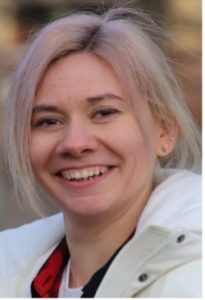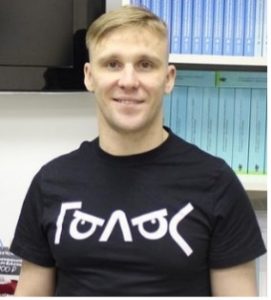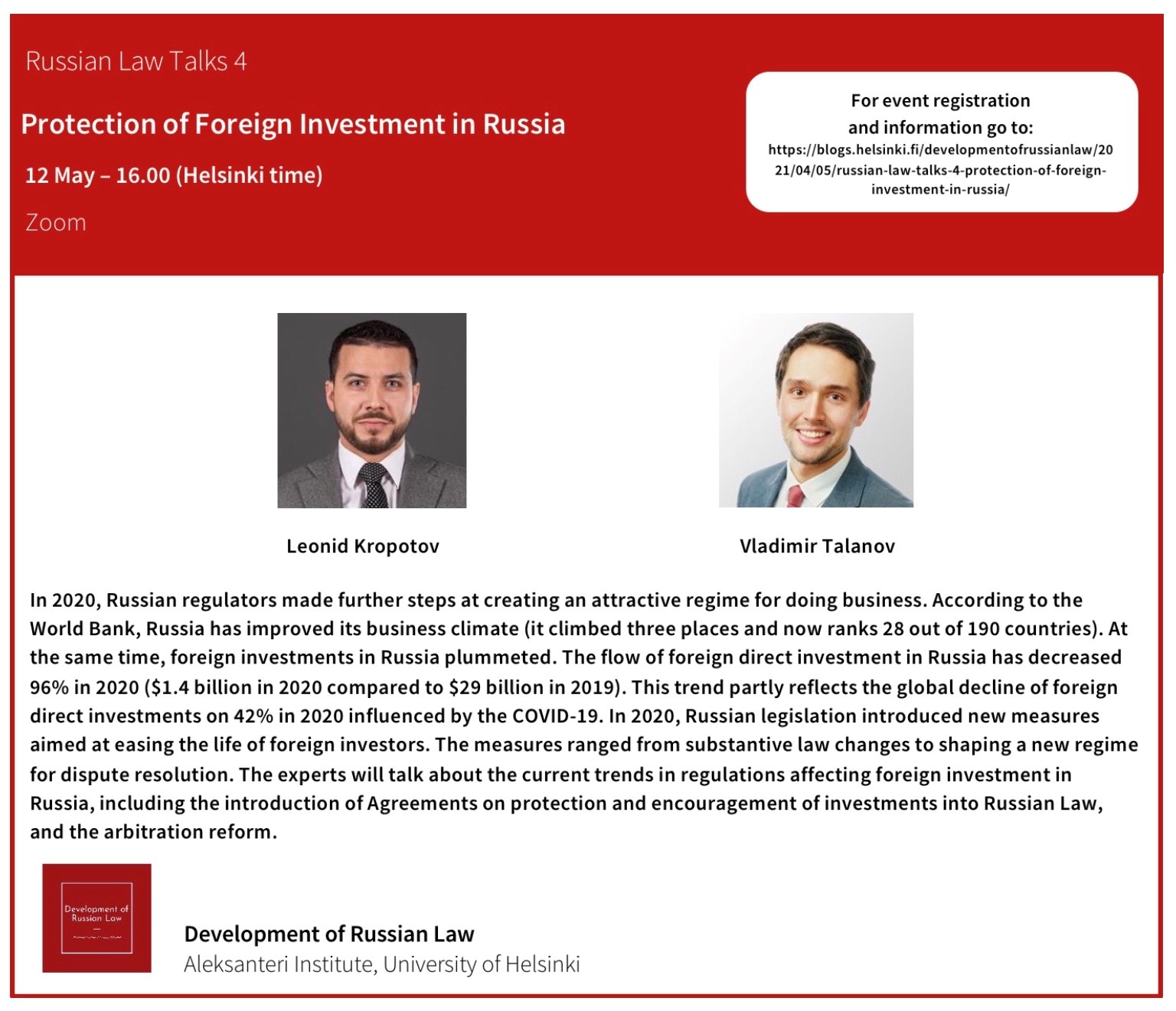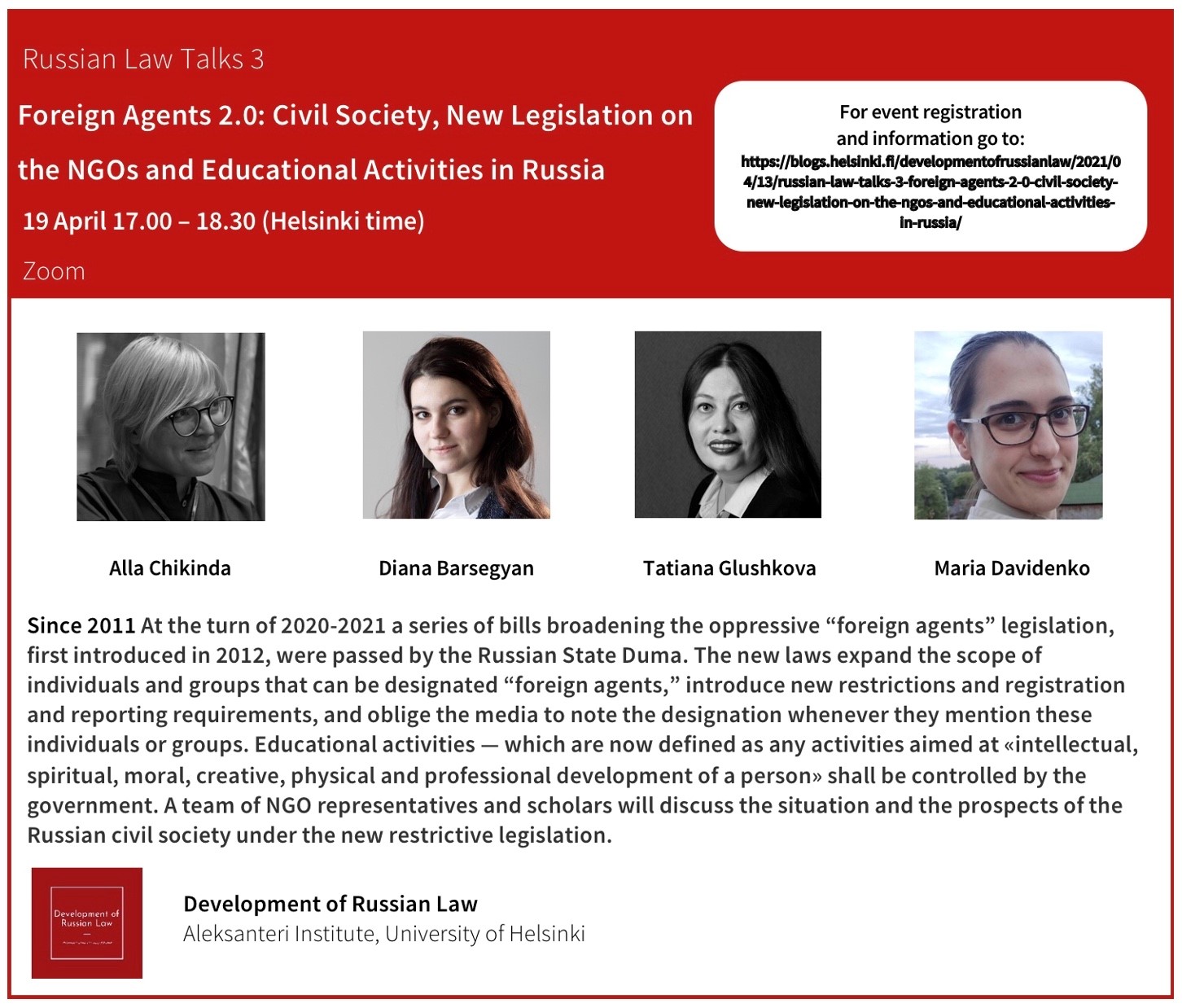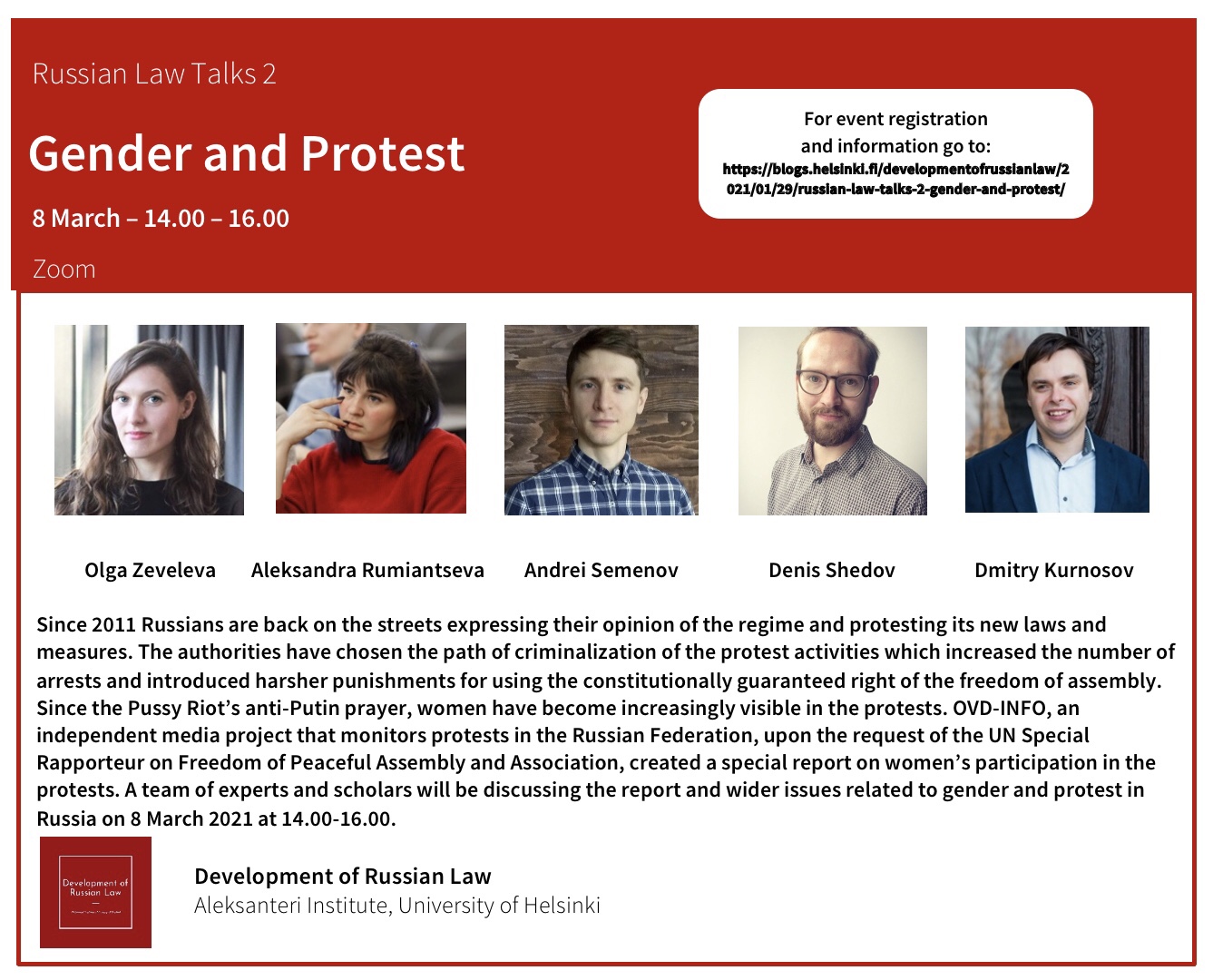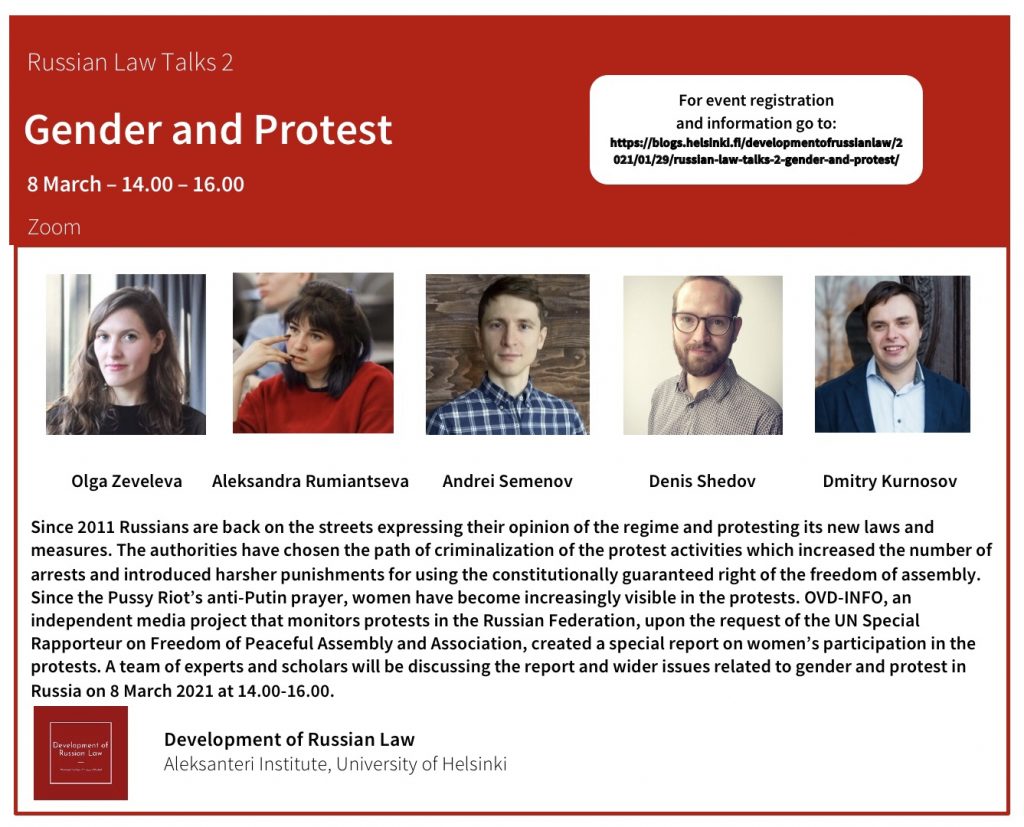Development of Russian Law 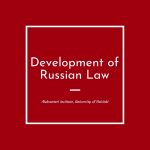
Uutiskirje Marraskuu (2020) / Newsletter November (2020)
Dear all:
This is the first issue of the newsletter from the project in Development of Russian Law.
Please, check our page here: https://blogs.helsinki.fi/developmentofrussianlaw/. We offer news on publications and events from us and our partners or what we find interesting and relevant. If you are interested in any of the events or would like to disseminate any of the news, do not hesitate to do so.
We also invite you to check our blog and contribute to it. Check our guidelines here: https://blogs.helsinki.fi/developmentofrussianlaw/our-submission-guidelines/.
If you have any questions, please, contact Serafima Karkkila at serafima.karkkila@helsinki.fi.
Development of Russian Law team
Events
1) INEQ research seminar, Policing the Park: Sex Panic, Surveillance and Neoliberal Urban Governance with Kris Clarke and Marianna Muravyeva, on 19 Nov at 12:15, Porthania P545 and via Zoom
2) On-line Workshop from our sister project Queering Family Violence: setting agenda for queer wellbeing, 1, 3, and 4 Dec 2020
3) National XIX Legal Research Conference 2021: Sustainable and Responsible Law for Society, 26 and 27 Aug 2021 at the University of Lapland
4) Master’s program in Global Governance Law: prepare for 2021 admission campaign – Russian Law is a 2nd year specialisation stream
5) Invitation to EUGenDem online workshop sessions
Public talks:
6) Marianna Muravyeva talks ‘Pandemic and Gender-Based Violence’ in the webinar ‘Rights, Democracy and Equality in the Shadow of the Pandemic’
7) INHS Biennial Conference December 2 & 3, 2020 – The International Network for Hate Crimes
Publications:
8) Elena Cirkovic’s new article in the German law journal: ‘The Next Generation of International Law: Space, Ice, and the Cosmolegal Proposal’
9) FEMINISM, POWER, AND NUCLEAR WEAPONS: AN EYE ON THE P5, Marianna Muravyeva’s report on Russia p. 37
10) Comparative Equality & Anti-Discrimination Law Electronic Journal, Volume 1, Issue 7
11) Alexander Kondakov’s chapter ‘Regulating Desire in Russia’ in the recent publication ‘Research Handbook on Gender, Sexuality and the Law’
12) Marianna Muravyeva’s chapter on Russia #17 – I Am Not Afraid to Tell: The #MeToo Movement in the Russian Federation – is published in this book!
13) Marianna Muravyeva’s and Alexander Gurkov’s chapter on Digitalization and Russian Law in the forthcoming publication of The Palgrave Handbook of Digital Russia Studies
1) INEQ research seminar, Policing the Park: Sex Panic, Surveillance and Neoliberal Urban Governance with Kris Clarke and Marianna Muravyeva, on 19 Nov at 12:15, Porthania P545 and via Zoom
Policing the Park: Sex Panic, Surveillance and Neoliberal Urban Governance
This study explores how a police sting that targeted men soliciting sex with other men around public park toilets in Fresno, California led to an increase in the jurisdictional authority of and resources for local law enforcement. These municipal changes included the installation of a surveillance system that stretched well beyond the park toilets and into poor Black and Brown neighborhoods.
By analysing the trajectory of local decision-making about the policing of public parks, we argue that law enforcement and other officials stoked sex panic about same sex erotic activity to cloak other vested interests. Namely, law enforcement invented a criminal threat to enhance its own profession through fiscal and bureaucratic expansion. Sex panic demobilised and delegitimised opposition to these law enforcement efforts even among more liberal public officials.
As a result, the sting fueled ongoing law enforcement practices that targeted poor neighborhoods of colour. Our conclusion considers how exploiting the public’s fear of perilous social disorder distorts the priorities of city government while also strengthening racial and class segregation.
19 Nov at 12-14 (12:15-13:45), Porthania P545
Discussant: Associate Professor Marianna Muravyeva (UH), law, Aleksanteri Institute
https://www.helsinki.fi/en/ineq-helsinki-inequality-initiative/ineq-research-seminar-autumn-2020#section-94960
2) On-line Workshop from our sister project Queering Family Violence: setting agenda for queer wellbeing, 1, 3, and 4 Dec 2020
Setting agenda for queer wellbeing, 23-27 Nov 2020
The project ‘Queering Family Violence’ (QFV) invites scholars engaging with queer theory, gender studies, social work, law, and sociology to participate in the on-line workshop ‘Queering Family Violence: setting agenda for queer wellbeing’ which will be held on the 23-27 November 2020. https://blogs.helsinki.fi/queering-family-violence/
3) National XIX Legal Research Conference 2021: Sustainable and Responsible Law for Society, 26 and 27 Aug 2021 at the University of Lapland
National XIX Legal Research Conference 2021: Sustainable and Responsible Law for Society
Sustainability has become a central societal value, pursued through a variety of policy instruments. Often such policy instruments take the form of law and legal regulation. Policies and legal instruments fostering sustainability seem to signal a responsible approach to governing our society. They thus indicate our responsibility to the society and future generations. But what are the implications of such policies and legal instruments, and how to pursue sustainability in a responsible manner though policies and laws? The National XIX Legal Research Conference 2021 will explore these important themes in broad terms and from multiple angles and perspectives.
The conference programme and the call for workshop presentations will be published in January 2021.
26 and 27 August 2021, University of Lapland (Rovaniemi, Finland)
https://www.ulapland.fi/EN/Units/Rovaniemi-Lapland-Congresses/Conferences
4) Master’s program in Global Governance Law: prepare for 2021 admission campaign – Russian Law is a 2nd year specialisation
HOW TO DEAL WITH THE CHALLENGES OF GLOBALISING LAW?Globalisation has brought about a situation where lawyers are now required to grapple with national, international, European, and transnational laws when they apply norms. In the two-year research-oriented Master’s Programme in Global Governance Law (GGL), you develop the skills to understand and deal with the challenges of globalising law.
You study public international law, European Union law, global administrative law, advanced human rights law and examine for example international institutions, decision-making and governance in the EU. You can also specialise in Russian law, Chinese law or engage in interdisciplinary studies in Global Politics and Communication.
Find out more about the programme structure, content and courses from the link below
https://www.helsinki.fi/en/admissions/degree-programmes/global-governance-law-masters-programme
5) Invitation to EUGenDem online workshop sessions
Welcome to the new EUGenDem series of online workshops starting this December!
As most of us lost the opportunity to meet and discuss our research due to the COVID19 restrictions, we are organizing this series with both academics and practitioners to debate ‘Gender, democracy and polarized politics in Europe’.
Our first workshop ‘European Parliament’s political groups in turbulent times: New research avenues’ will take place on 15 December 2020 at 3PM (EET) on Zoom and feature some key research coming out of the EUGenDem project.
Johanna Kantola: Gender and democracy in European Parliament’s party group practices
Valentine Berthet, Anna Elomäki, and Barbara Gaweda: Political dynamics, power struggles, and intra-group policy formation in the European Parliament
Cherry Miller: ‘Ethno, ethno, what?’ How Parliamentary Ethnography can help us to better understand Parliament’s Political Groups
For more details and to register, please follow the link:
https://research.uta.fi/eugendem/eugendem-workshop-european-parliaments-political-groups-in-turbulent-times-new-research-avenues/
The workshop sessions in 2021 will include talks by key scholars working on the European Parliament; gendered parliaments; democratic backsliding; gender policy issues; impacts of Covid-19 on parliamentary politics and gender policy; and parliamentary ethnography.
Check the program here:
https://research.uta.fi/eugendem/eugendem-workshop-sessions-2020-21-gender-democracy-and-polarized-politics-in-europe/
6) Marianna Muravyeva talks ‘Pandemic and Gender-Based Violence’ in the webinar ‘Rights, Democracy and Equality in the Shadow of the Pandemic’
Dr. Marianna Muravyeva talks “Pandemic and Gender-Based Violence” in the webinar “Rights, Democracy and Equality in the Shadow of the Pandemic”. Watch the webinar from the link below.
Unitube: https://www.helsinki.fi/fi/unitube/video/4437fa0f-667d-42c8-b414-26cca0a36834
For this webinar and other talks on inequality, click here:
https://www.helsinki.fi/en/ineq-helsinki-inequality-initiative/activities/inequality-talks
7) INHS Biennial Conference December 2 & 3, 2020 – The International Network for Hate Crimes
Alexander Kondakov will be speaking in a conference on hate crime in December 2020:
INHS Conference 2024
INHS Biennial Conference December 2 & 3, 2020 – The International Network for Hate Studies
Hate, Democracy, and Human Rights
INHS Biennial Conference INHS Biennial Conference December 2 & 3, 2020 – The International Network for Hate Studiesfice for Democratic Institutions and Human Rights (ODIHR) and the University of Plymouth. Sessions and Speakers Prior to the Conference a number of video presentations of papers (our asynchronous papers) will be placed…
internationalhatestudies.com
8) Elena Cirkovic’s new article in the German law journal: ‘The Next Generation of International Law: Space, Ice, and the Cosmolegal Proposal’
Dr. Elena Cirkovic has published new article in the German law journal titled “The Next Generation of International Law: Space, Ice, and the Cosmolegal Proposal”. Read the article here:
https://researchportal.helsinki.fi/en/publications/the-next-generation-of-international-law-space-ice-and-the-cosmol-2
The latest session of the Space Café
In this session of Space Café “Moriba’s Vox Populi #01/2020” Dr. Moriba Jah talked about topics of relevance to space safety, security, and sustainability with Dr. Elena Cirkovic – Postdoctoral Researcher, Aleksanteri Institute – Finnish Centre for Russian and East European Studies, Dr. Meredith Rawls – Research Scientist, Department of Astronomy University of Washington, Daniel Ceperley – Chief Executive Officer and Co-Founder of LeoLabs, Doug Loverro – former associate administrator of NASA’s Human Exploration and Operations Mission Directorate and Deputy Assistant Secretary of Defense for Space Policy.
9) FEMINISM, POWER, AND NUCLEAR WEAPONS: AN EYE ON THE P5, Marianna Muravyeva’s report on Russia p. 37
FEMINISM, POWER, AND NUCLEAR WEAPONS: AN EYE ON THE P5
What does Feminist Foreign Policy mean for nuclear policy?
The goal of any good Feminist Foreign Policy is to rebalance inequitable hierarchies – and these hierarchies are abundant in nuclear policy. So as the nuclear possessing permanent five members (P5) of the UN Security Council begin to engage with Feminist Foreign Policy, what does this mean for their nuclear policy? Toni Haastrup, Yasmeen Silva, Carina Minami Uchida, Lovely Umayam, and Marianna Muravyeva discuss. (From the official site)
Dr. Marianna Muravyeva’s report on Russia is on p. 37
Read the report here
https://centreforfeministforeignpolicy.org/feminism-power-and-nuclear-weapons-an-eye-on-the-p5
10) Comparative Equality & Anti-Discrimination Law Electronic Journal, Volume 1, Issue 7
Comparative Equality & Anti-Discrimination Law Electronic Journal, Volume 1, Issue 7
Click the link below to read the September issue of the electronic journal of the Berkeley Center on Comparative Equality & Anti-Discrimination Law
https://drive.google.com/file/d/1X55-Kyp2xNIBJPt3bfOzA08Pkd-X4iry/view?usp=drivesdk
This issue was edited by Lynda Crowley-Cyr and Marianna Muravyeva, with assistance from Anna Maria Camardo, Fernaz Mohamadi, and Yolanda Ye.
11) Alexander Kondakov’s chapter ‘Regulating Desire in Russia’ in the recent publication ‘Research Handbook on Gender, Sexuality and the Law’
Alexander Kondakov writes about deviancy and illicit constructions in his chapter ‘Regulating desire in Russia’ in the book ‘Gender, Sexuality and the Law’.
Available for purchase here:
https://www.e-elgar.com/shop/gbp/research-handbook-on-gender-sexuality-and-the-law-9781788111140.html
12) Marianna Muravyeva’s chapter on Russia #17 – I Am Not Afraid to Tell: The #MeToo Movement in the Russian Federation – is published in this book!
Marianna Muravyeva’s chapter on Russia #17 – I Am Not Afraid to Tell: The #MeToo Movement in the Russian Federation – is published in this book! Intro by Catherine McKinnon
From the official cite
When US activists started using the #MeToo hashtag (as created by Tarana Burke) to speak out against sexual harassment, they joined, and then helped propel, a global movement.
On every continent, women are using the new tools of social media to confront one of the oldest barriers to equality: the threat of violence, including sexual harassment, as a tool of male supremacy. In The Global #MeToo Movement, produced by the Berkeley Center on Comparative Equality & Anti-Discrimination Law, 48 authors from 28 countries spanning every continent but Antarctica tell the story of how social media has driven a social movement against sexual harassment, and how the law has responded, often by helping men to push back.
https://www.globalmetoobook.com/
13) Marianna Muravyeva’s and Alexander Gurkov’s chapter on Digitalization and Russian Law in the forthcoming publication of The Palgrave Handbook of Digital Russia Studies:
Book launch – The Palgrave Handbook of Digital Russia Studies
Join us on 22 October at the virtual book launch to celebrate the publication of The Palgrave Handbook of Digital Russia Studies.
The official description of the book:
“This groundbreaking Handbook, edited by DRS researchers Daria Gritsenko and Mariëlle Wijermars together with Mikhail Kopotev, presents a multidisciplinary perspective on how the ‘digital’ is simultaneously changing Russia and the research methods scholars use to study Russia. It provides a critical update on how Russian society, politics, economy, and culture are reconfigured in the context of ubiquitous connectivity and accounts for the political and societal responses to digitalization. In addition, it answers practical and methodological questions in handling Russian data and a wide array of digital methods.
32 chapters by 42 authors – published in open accessthanks to the generous support of the University of Helsinki.”
Book launch – The Palgrave Handbook of Digital Russia Studies
Dr. Marianna Muravyeva and Alexander Gurkov write about Russian law, digitalisation, and gender
https://www.palgrave.com/gp/book/9783030428549#:~:text=Conceptually%20rich%2C%20analytical%20smart%2C%20and,into%20a%20newly%20emerging%20discipline.
****
Development of Russian Law team
About the Project
You can find us on
Facebook | Instagram | Twitter
Have a nice weekend,
Serafima Karkkila
Tutkimusavustaja / Research assistant
Development of Russian Law
serafima.karkkila@helsinki.fi
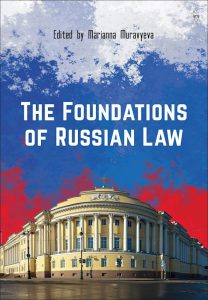
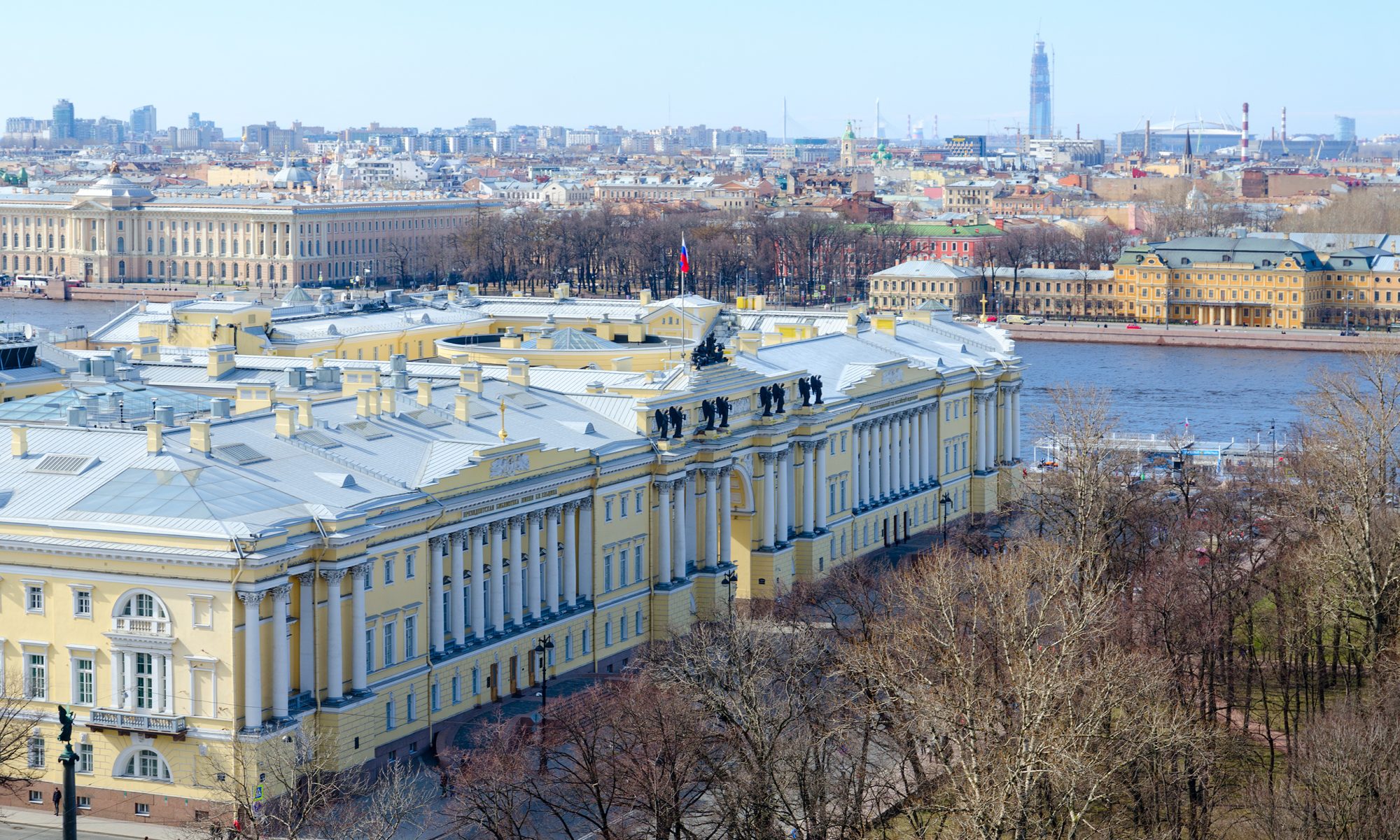

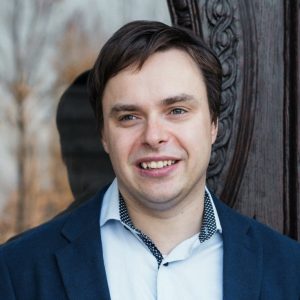 Dmitry Kurnosov studies how the election jurisprudence of the European Court of Human Rights impacts the development of law, resolution of electoral disputes and election administration in Finland, Denmark, and several Post-Soviet countries. He holds a PhD in Law from the University of Copenhagen. Prior to becoming a researcher, Dmitry has for several years been a Deputy Spokesperson of the Russian Constitutional Court.
Dmitry Kurnosov studies how the election jurisprudence of the European Court of Human Rights impacts the development of law, resolution of electoral disputes and election administration in Finland, Denmark, and several Post-Soviet countries. He holds a PhD in Law from the University of Copenhagen. Prior to becoming a researcher, Dmitry has for several years been a Deputy Spokesperson of the Russian Constitutional Court.